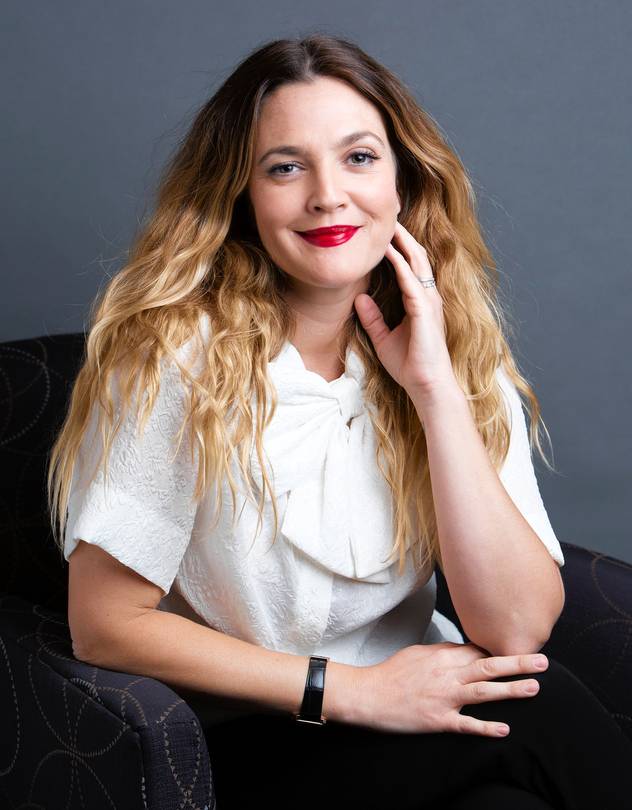
The actress looks back at her early struggle in Hollywood for stability, safety and a sense of family
Drew Barrymore, 40, has starred in more than 50 films, including “E.T. the Extra-Terrestrial” and “The Wedding Singer.” She is author of “Wildflower” (Dutton), a collection of autobiographical essays. She spoke with Marc Myers.
My childhood lasted four years. Then I went to work. Though my father, grandparents, great-grandparents and great-uncles and great-aunts all had been prominent actors in their day, my parents weren’t in the business when I was born. In fact, they weren’t even together. I started life with little more than my last name.
I grew up with my mother, Jaid, on North Poinsettia Place in West Hollywood, which was pretty rough in the late 1970s. We lived in a modest apartment in a one-story white stucco duplex.
What I remember most are the bougainvillea vines that climbed 25 feet up the wall outside and bloomed beautiful burgundy flowers. Those colorful vines were heartwarming, like a big smile.
In the late ’70s, my mother was an aspiring actress who worked two jobs at nearby comedy and music clubs. Many of my mother’s friends were artists who were pretty wild and eccentric. Those were happy years for me.
My father, John, had been a film and TV actor, but by the time I was born he was living a far wilder, free-spirited life. I know he had his demons, but I loved him. As a child, I thought he was fascinating, interesting and funny. I also never wanted to be heavy about anything that was going on around me. No matter what, I always carried the umbrella of joy, probably as a survival strategy.
The apartment I lived in with my mother had a patch of backyard with a swing set and an avocado tree with willowy branches. The yard was a place of solace, and I loved that the tree was always there with food ready to eat.
When my mother went to work, a young girl would come over and baby-sit me. If my mother didn’t return in time, the girl would drop me off at friends’ houses. I was never left alone, but I was lonely.
Kids don’t really like things changing all the time. For me, everything was oceanic and passing through, and nothing was grounded. I wasn’t negative or dark. I just didn’t feel emotionally safe. I developed a deep appreciation for friends and the need to stick together.
My mother began taking me on auditions for TV ads when I was 3. Then came films starting at age 5. I remember working so hard to impress the adults evaluating me. Doing well and impressing adults led to jobs that provided consistency, safety and stability. I knew where I’d be going each day, I knew what was expected of me, and I saw the same people on the set. The actors and directors became like a second family.
After the success of “E.T.” in 1982, my career took off. My mother quit her jobs to manage my career and bought us a house in nearby Sherman Oaks, which uprooted me. I didn’t want to leave our West Hollywood apartment and the people next door.
Over the next few years my mother and I had a challenging relationship. When I was 14, it became clear we had to part ways, and fortunately my mother was in full support of me. I moved into my own apartment in L.A.’s Park La Brea area. The owner didn’t care how old I was.
My work in the movies forced me to grow up fast, so living alone at that age wasn’t a challenge. I felt much older than 14. I learned to take care of myself, hold down a job and even do the laundry.
I read every classic novel I could get my hands on—plus the thesaurus and dictionary. Eventually, I began to act again and later to produce and direct, once again surrounding myself with a creative family.
Today, I live in West Hollywood with my husband, Will, and our two daughters, Olive and Frankie. Our three-bedroom house has lots of burgundy bougainvillea and light, and it feels like France.
We live near the apartment my mother and I shared in the ’70s, so I often drive by. I have this nagging desire to knock on the door with hopes the people will let me in for a look around.
But if they did, I really don’t know what I’d be looking for or what I’d learn about myself. I suppose there’s part of me that’s still seeking the rest of my childhood.
(Source)






Comments are closed on this post.